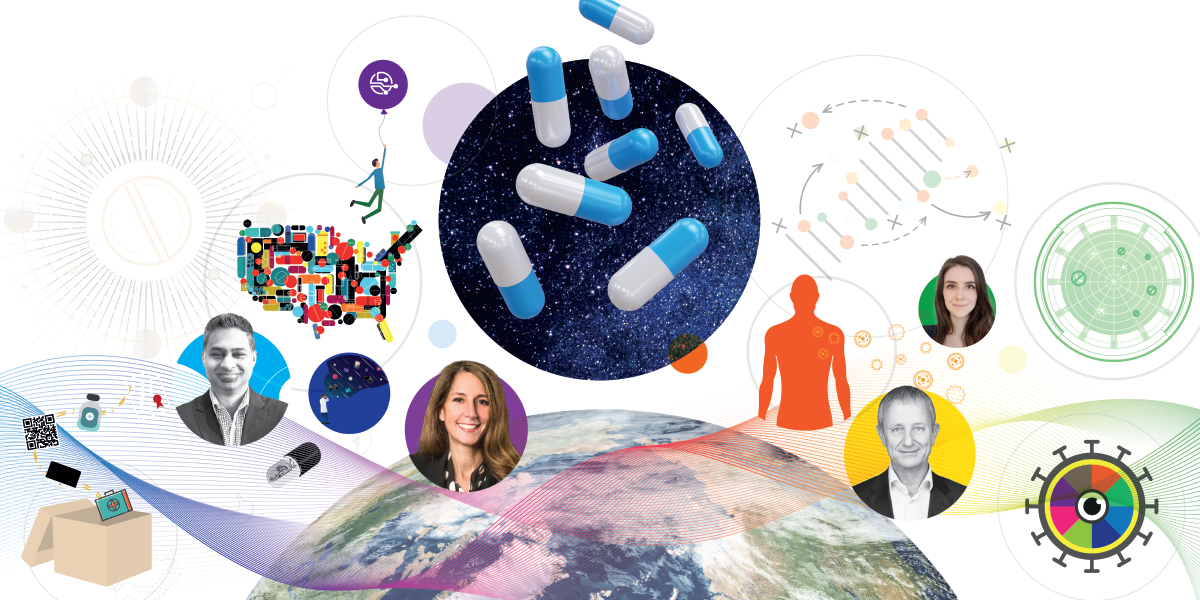The Multifaceted Future of Pharma – Chapter 6: AI: Transforming Discovery and Development
From accelerated accuracy in the trials and approvals processes, to improved understanding of a disease at the molecular level, experts share their predictions.
The anticipated changes brought about by the integration of AI in clinical and preclinical phases are set to revolutionize the drug discovery and development processes. Key themes include accelerated accuracy in the trials and approvals processes, and improved understanding of a disease at the molecular level. Take it from those witnessing these changes in their everyday operations.
We asked: “Looking ahead to the next 5–10 years, what will be the key disruptors and/or what can be improved upon in the pharma industry?”

“The integration of AI and ML technologies stands to dramatically transform the biopharma industry. Iterative in silico learning systems that benefit from large training datasets and that integrate wet lab validation experiments are starting to deliver significant gains in the quality and speed of target identification, hit finding, and candidate optimization. The preclinical proof-points are encouraging, and the hope is that these strides translate into higher quality clinical candidates delivered more quickly to the patients who can most benefit.”
“On the development front, generative AI-based tools may evolve to being able to support patients and practitioners in navigating treatment algorithms and clinical trials. Ensuring that patient genetics, medical histories, and symptoms are weighed against all available clinical study data and real-world evidence could provide optimized, personalized treatment algorithms. Promising clinical trials could also be flagged on a personalized basis based on totality of evidence, including the mechanism of action of the investigational agent and the knowledge base around the relevant disease subtype. Management of privacy and consent will be critical to the integrity of these approaches.”
“We may not be far from a future where AI and ML can assist patients and physicians in predicting and managing health outcomes prior to disease inception, as well as in the early stages of disease. The ability to integrate massive real-world datasets with real-time health monitoring and diagnostics holds exciting potential. To really move the needle on human health, we need to develop and deliver medicines much closer to disease inception, when the biology is at its most malleable.”

“There has been a whirlwind of change in the industry – and technology has been at the heart of this transformation. AI and ML have become essential tools, speeding up drug discovery, improving clinical trials, and tailoring treatments to individual patients. Plus, with a deeper understanding of our genes, we’re developing medicines that are as unique as the people who take them. Additionally, digital health tools are changing how we connect with patients and gather information.
“However, it’s more than technology. Rules and regulations within the pharma industry have also played a big role. We’ve seen faster approval processes for groundbreaking treatments, and those have been a game-changer. By expediting the development and commercialization of innovative therapies, regulatory changes have facilitated quicker patient access to life-changing treatments.
“I believe the future of drug discovery is marked by considerable promise, with AI poised to play an increasingly pivotal role. Advancements in AI, particularly in generative models, hold the potential to revolutionize the de novo design of therapeutic molecules. Moreover, the convergence of AI with vast datasets and profound insights into human genetics is propelling the field towards personalized medicine.
“Last, another area where technology is making a real difference is in finding new uses for old drugs. AI can analyze mountains of data to discover hidden potential in existing medicines. This could speed up the development of new treatments, lower costs, and help patients with rare diseases.”

“AI has led to a significant shift in the way biopharma and life sciences organizations operate. Elsevier's Corporate Researcher Attitudes Toward AI survey shows that 71 percent of life sciences researchers believe the impact of AI will be transformative to their work with the potential to reduce R&D timelines, identify projects with a higher likelihood of success – e.g. by predicting potential drug efficacy/risk of side effects – and uncover new leads missed with traditional approaches. Taken together, AI has significant potential to help drug developers improve the ROI across this industry.
“Advances in data management have been essential to this transformation over the past decade. From big data and business intelligence to decision-making support and predictive analytics, and now to AI and ML, we have seen a significant improvement in the way biopharma organizations generate, integrate, and interrogate their own data alongside that from external sources to improve multiple stages of the drug discovery process.
“With the establishment of generative AI, we are set to see even more advances in innovation. However, as genAI usage increases in the R&D pipeline, organizations must incorporate foundational data technologies, such as ontologies, to support the future of responsible genAI usage and unlock the full potential of this technology.”

“I believe that natural language AI chat will become the everyday interface of choice for scientists. In the pharmaceutical and biotech industries, the integration of cutting-edge natural language processing, AI, ML, and large language models into lab informatics solutions will dramatically improve the progress and outcome of drug discovery programs, and positively impact the productivity of scientists, researchers, and clinicians. It will also enable scientists to enhance and document experimental procedures, quickly summarize, interpret, and contextualize complex scientific data, exhaustively review scientific and clinical literature, and accelerate the development of new molecules.
“For these advanced technologies to make real, profound improvements in the life sciences, however, some unique challenges must be addressed. These include allowing AI models to access and interpret huge, complex data sets and providing a high degree of specificity for new and varied data types from experiments and advanced instrumentation. Another key challenge will be a rethinking of how scientists interact with scientific experiments, assays, instruments, and data in drug discovery, manufacturing, and clinical diagnostics.
“Traditional user interfaces in laboratory informatics systems require scientists to navigate through hierarchical menu structures, input data into predefined forms, use multiple systems to accomplish a task, utilize specific commands, and even write SQL code to perform tasks – otherwise, they depend on often overwhelmed informatics teams to perform these complex tasks. Transforming these mouse-driven ineffective interfaces to natural language inputs, combined with AI, either through voice recognition or text-based commands, will empower scientists and elevate laboratory informatics platforms to function as true scientific assistants that a human scientist can ideate with, much like working with a colleague. By bridging the gap between human creativity and machine efficiency using natural language, these technologies have the potential to usher in a new era of scientific productivity and innovation.”

“The integration of AI with empirical wet-lab validation could dramatically improve the process of drug discovery. It would fundamentally transform pharmaceutical research by enhancing both the efficiency and the robustness of drug development processes.
“AI-driven in silico models excel at rapidly predicting molecular interactions and potential therapeutic targets, enabling high-throughput drug screening. However, the predictive power of AI must be rigorously confirmed through wet-lab experiments. These experimental validations are critical as they provide empirical data on the biological relevance and efficacy of the predictions made by AI algorithms.
“This combined approach significantly streamlines the drug discovery pathway. By employing AI for initial screenings, we can focus wet-lab resources on the most promising candidates, thereby reducing the incidence of costly failures in later stages. Furthermore, this method supports a more targeted exploration of complex biological pathways, potentially leading to breakthroughs in treating diseases with currently limited options.
“Advocating for the integration of these technologies is essential. By doing so, we can ensure that new therapeutic agents are not only innovative but are also substantiated by solid empirical evidence, thereby advancing the field toward more rapid and reliable drug development.”

“I believe that the transformative potential of AI will revolutionize the pharmaceutical and drug development industry. The integration of AI with human intelligence is poised to take chemistry laboratory workflows to new heights, enabling scientists to quickly find and easily navigate innovative pathways for both novel and published target molecules.
“The advent of AI-driven software represents a significant disruptor in the industry, and will continue to shape the future of scientific research and lab efficiencies in the next 10 years. By combining expert knowledge with modern AI, scientists can embark on unparalleled synthesis planning, swiftly navigating through innovative pathways for their target molecules. This strategic partnership between human expertise and AI capabilities holds the potential to drive groundbreaking advancements in drug discovery and development.
“In addition to the groundbreaking potential of AI, the pharmaceutical and drug development industry stands on the brink of another technological revolution – virtual reality (VR). The incorporation of VR technology will reshape the industry by providing scientists with immersive and interactive tools to visualize complex molecular structures. This transformative capability will enable a deeper understanding of the biological mechanisms involved in diseases and the potential effects of pharmaceutical compounds, ultimately expediting the development of new treatments.”

“Drug discovery has an enormously high failure rate, primarily because of inaccuracies in predicting human responses based on animal testing. This results in a significant financial loss for pharma companies, and the human cost is immense as potentially life-saving treatments are delayed or never reach the market.
“AI has emerged as the most significant disruptor in the pharma industry. The convergence of AI with big data analytics, machine learning, and advanced biotechnologies has revolutionized traditional methodologies, leading to more efficient, cost-effective, and innovative solutions in drug development. AI could have an impact on:
- Accelerated drug discovery. AI algorithms rapidly analyze vast datasets to identify potential drug candidates. ML models predict molecular behavior, optimize compound structures, and can streamline the initial phases of drug development.
- Personalized medicine. AI can analyze patient data to predict individual responses to treatments, leading to the development of tailored therapies that enhance efficacy and minimize adverse effects.
- Predictive analytics in clinical trials. AI can optimize clinical trial design and execution by identifying suitable candidates, predicting outcomes, and monitoring patient adherence in real-time. This not only increases trial success rates but also reduces costs and timelines.
“This AI-driven transformation has paved a path for innovative bio-AI platforms that integrate AI with advanced in vitro models to predict drug safety and efficacy more accurately than traditional methods. Leveraging ML algorithms, patient-on-a-chip breakthroughs and vast datasets of biological interactions will pioneer a new approach to drug development. For example, combining AI with human tissue models can simulate human responses to drug candidates more precisely.
“The next decade will see the proliferation of integrated AI platforms that combine multiple AI technologies to manage the entire drug development lifecycle. These platforms will enhance collaboration across different stages, from discovery to post-market surveillance, ensuring a seamless and efficient process. I also believe that AI will democratize access to healthcare by providing low-cost diagnostic tools and treatment recommendations in underserved regions. Mobile AI applications will empower healthcare providers with real-time data and insights, improving patient outcomes globally. Regulatory bodies will also increasingly adopt AI to streamline the approval process for new drugs. AI-driven simulations and predictive models will provide robust evidence of safety and efficacy, expediting the regulatory pathway and bringing life-saving drugs to market faster.”

“It’s no secret that new technologies, from AI and ML to big data and high-performance computing, have changed how we approach R&D. The integration of these technologies into day-to-day work has the potential to not only expedite drug discovery, but also contribute to a better understanding of diseases at the molecular level.
“At the same time, new modalities such as antibody-drug conjugates, bispecific antibodies, and cell and gene therapies offer the potential to treat previously difficult-to-treat diseases. With hundreds of antibodies undergoing pre-clinical and clinical development, it is anticipated that the number of antibody medications in clinical trials and approved by regulatory agencies will continue to rise, which will in turn bring new medicines to those who need them.
“The confluence of new technologies and modalities has altered how we deliver medicines to patients, and we must continue to unlock their full potential so we can impact as many lives as possible with breakthrough therapies.”

“There has been a significant increase in the proliferation of clinical trial data. According to a 2021 study by Tufts University, phase III clinical trials generated an average of 3.6 million data points, three times the amount of data collected by late-stage trials in 2011. Our internal analysis suggests that these clinical trial data sets will skyrocket to seven times that of 2011 by 2030. The availability of data has proven to be both a blessing and a curse. It’s a blessing because it has fueled incredible scientific discovery and technological innovation, including the evolution of AI models; and a curse since now that we have the data, we need to integrate and harmonize it to make it useful.
“Modern technologies have the power to process large amounts of unstructured and structured data, providing accurate recommendations on everything from sales to clinical research. Yet data is the lifeblood of AI – without it, AI models cannot learn or make accurate predictions. However, in clinical research, no single entity possesses all the data. Collaborative efforts are thus essential to move the industry forward. The rapid development of COVID-19 vaccines was a testament to the power of collective action and information sharing amongst pharmaceutical entities, medical professionals, technology experts, and regulatory bodies. Such collaboration allows AI to achieve monumental tasks within relatively short timelines in clinical research.
“In the long term, AI that draws from accurate, comprehensive, less biased data sets enables a continuous learning cycle for increasingly more granular and accurate results. Greater access to disparate data sources also helps to prevent biased AI outputs. This is the future – AI will become emboldened and powerful due to shared sets of data for the benefit of all.”
